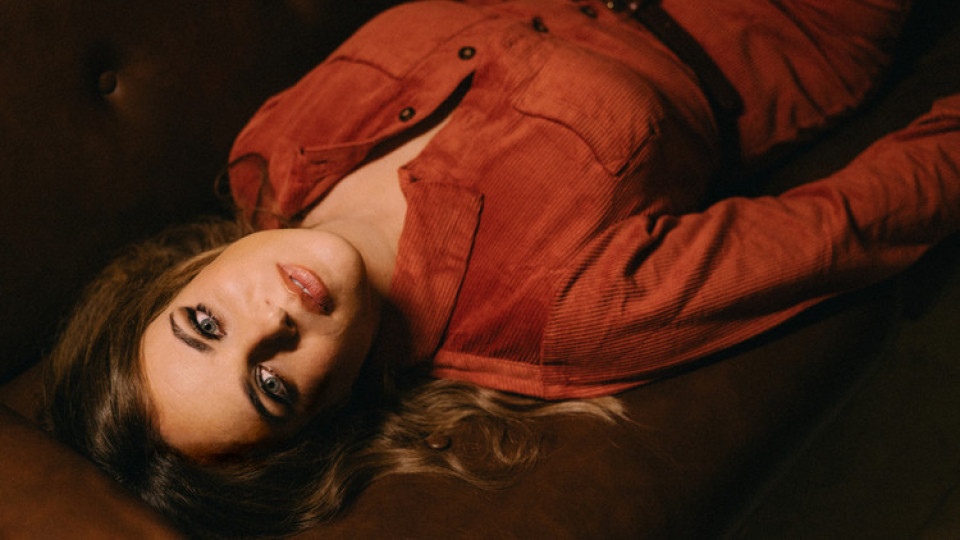"There is nothing that can be more transformative than our truth"
O Notícias ao Minuto spoke to the singer Joana Espadinha, who released her fourth original album "Vergonha na Cara".

© INIT4DAMUSIC

Cultura Joana Espadinha
In this new album 'Vergonha na Cara', Joana travels within herself, to the teenager she was and to the more mature adult she is. Why did you feel the need to explore this and compose it?
In fact, it was not a very conscious process. I start writing the songs and then I start to notice that there is a common thread. I think the return to adolescence is significant because it is a phase that is then defining of our personality. There are many things that then accompany us throughout our lives, many memories. We are very nostalgic about adolescence but also about things that did not go so well or that we would have liked to have been different. Or characteristics that, in my case, were some shyness or some shame in expressing myself that, later - decades later - I still feel the need to address and resolve within myself. That's why I think adolescence is a theme that ended up coming to the surface in some of these songs that I wrote - and that would then provide a good cue for the album title.All your albums have been very different, although from the second ['O Material Tem Sempre Razão', from 2018] to the third ['Ninguém Nos Vai Tirar O Sol', from 2021] there was a logic of continuity. What made you start over, so to speak?
For now, there is a practical issue. Those two albums marked the partnership with Benjamim as a producer. Now, the new album, had other producers. There is a song produced by Ben Monteiro - which was the first to be recorded - and then the rest of the album was produced by António Vasconcelos Dias. This immediately makes a difference, even though there are many things in common because Benjamim and António work together and we have some common aesthetic universe here. That is immediately a practical reason. Then, there was a phase when I was more stagnant, I had many artistic doubts about which path to follow and I think that time, for me, was essential to take the reins again as the artist and composer that I am and to recover some things that I had lost along the way. I have been fascinated by the search for the pop song in its balance - which is never perfect - of what is sweet, what is bitter, but which creates a more contagious and more positive energy in the listener. But I also missed addressing more melancholy, darker themes - that is also part of me - and in which the voice could have more space to express itself. With more ballads, a more acoustic register. I wanted this album to condense these two atmospheres. And, therefore, I clearly have a side A and a side B and the album is a good summary of the artist and composer that I am.My albums are always therapeutic for me because they solve these internal issues
You said earlier that this album "was really from the beginning to the end what I wanted". Is that why you worked with the new producers, António Vasconcelos Dias and Ben Monteiro?
Benjamin took a break from his work as a producer, so it would not be possible for me - even if I wanted to - to continue working with him as a producer. But I also think it was time to look for new influences and new partners to work with. "It was really from the beginning to the end what I wanted" because I had space to have the happier songs, for the more introspective songs and, sometimes, even melancholy songs. It was something I wanted to do for a long time. Then because, as a teenager, I listened to a lot of American music - I really like folk, rock - and I wanted to find my way, in the Portuguese language, to bring these influences from my musical tastes. And I think I managed to put that into practice. In addition, I wanted to take the reins of the process, and working with António allowed me to really have that space. I have always been fortunate to work with people who have given me creative space, but now, at this moment, I also know more about what I want. And this also helps a lot. I had a lot of space to experiment, to choose the instruments, to make arrangements. For example, the song 'Bala Perdida' has a string arrangement that I wanted to do and I ended up doing it with four hands. I ended up doing it with Filipe Melo, who is an incredible musician, artist and filmmaker. It was also a very personal album because of the subjects I talk about on the album, which concern me a lot. The new digital era and the implications it has for people's mental health - especially among teenagers - the issue of appearances, this paradox in which it seems that we are all more connected but also more distant because not everything we see on social networks is true. It was a topic that I also really wanted to talk about and I talk about it in 'Álibi'. And, above all, because I also talked about this 'grito do ipiranga', in which I assumed who I am and who I want to be, without 'shame on my face', which also has to do with the feminine universe and the constraints that we women have. Sometimes there is still a flea in my ear limiting my movements and thoughts, even when I think everything is in my favor, like a constant self-inflicted doubt by not believing in my worth. My albums are always therapeutic for me because they solve these internal issues.I think there is nothing that can be more transformative than our truth
Songs like 'Vergonha na Cara' or 'Vestir a Camisola' have strong verses and show Joana asserting herself, assuming what she feels and thinks. Do you consider that these lyrics freed you from a Joana who did not show herself completely, in her fullness? That you wanted to resolve with the ghosts of the past?
Without a doubt. This is my way of resolving the ghosts of the past. Obviously, our personality is our personality. I will always be a little shy, I will always have things to solve - this is not intended to solve my personality - but I think there is nothing that can be more transformative than our truth, what is true and genuine. This is my truth, it is my struggle, it is my conflicts, and also what I am passionate about. My albums are always autobiographical. Even when I don't want them to be, they always end up being.'Alibi' or even 'Será o que Será' are songs that talk about the discomfort you feel in relation to the plasticity that exists on social networks and in digital media. Why did you feel the need to express your opinion on this matter?
Because I myself feel very inconsistent, with very divided thoughts about the need - which is normal - to communicate through social networks, both personally and professionally, so that people know what I do, my work. It is impossible not to have a presence on the networks. But then I always feel that I should publish more, but that I don't want to publish more because I preserve my private life and I don't want anything out there that is not something that I really defend or believe in. It is very easy to be carried away by this need to feed the algorithm. I think that in a few years we will look at this in a different way. I am very cautious about what I publish. However, if I had a more active presence on social networks, it would be beneficial for my career, so I am always a bit torn. I am not demonizing social networks but I think that, increasingly, we have to think about this because the implications for mental health are enormous and it is enough to think that we all like to please, we all like to be liked. Social networks capitalize on this 'hunger' for validation - as I say in the lyrics - and that creates monsters.
Descarregue a nossa App gratuita.
Oitavo ano consecutivo Escolha do Consumidor para Imprensa Online e eleito o produto do ano 2024.
* Estudo da e Netsonda, nov. e dez. 2023 produtodoano- pt.com






